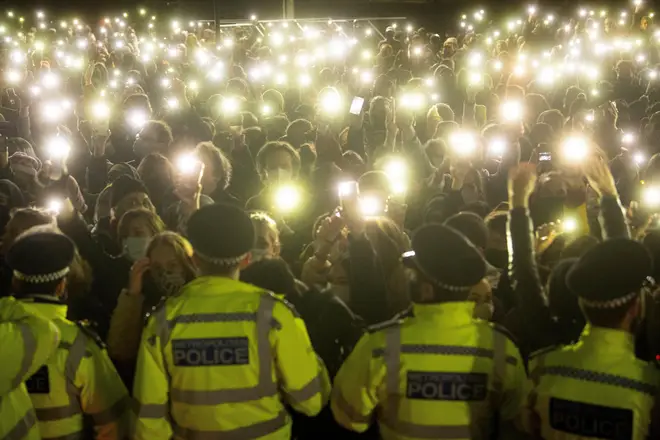
Simon Marks 4pm - 7pm
11 March 2022, 10:48 | Updated: 11 March 2022, 11:24

The Metropolitan Police breached the rights of organisers of a vigil for Sarah Everard with its handling of the planned event, High Court judges have ruled.
Reclaim These Streets (RTS) proposed a socially-distanced vigil for the 33-year-old, who was murdered by former Met officer Wayne Couzens, near to where she went missing in Clapham, south London, in March last year.
The four women who founded RTS and planned the vigil brought a legal challenge against the force over its handling of the event, which was also intended to be a protest about violence against women.
They withdrew from organising the vigil after being told by the force they would face fines of £10,000 each and possible prosecution if the event went ahead, and a spontaneous vigil and protest took place instead.

Watchdog backs police handling of Sarah Everard vigil
Jessica Leigh, Anna Birley, Henna Shah and Jamie Klingler argued that decisions made by the force in advance of the planned vigil amounted to a breach of their human rights to freedom of speech and assembly, and said the force did not assess the potential risk to public health.
In a ruling on Friday, two senior judges upheld their claim, finding that the Met's decisions in the run up to the event were "not in accordance with the law".
Read more: Police shouldn't show support for Ukraine or wear gay pride badges, says watchdog
In a summary of the ruling, Lord Justice Warby said: "The relevant decisions of the (Met) were to make statements at meetings, in letters, and in a press statement, to the effect that the Covid-19 regulations in force at the time meant that holding the vigil would be unlawful.
"Those statements interfered with the claimants' rights because each had a 'chilling effect' and made at least some causal contribution to the decision to cancel the vigil.
"None of the (force's) decisions was in accordance with the law; the evidence showed that the (force) failed to perform its legal duty to consider whether the claimants might have a reasonable excuse for holding the gathering, or to conduct the fact-specific proportionality assessment required in order to perform that duty."
After the ruling the Met's Assistant Commissioner Louisa Rolfe said: "“The Met worked very hard in challenging circumstances to interpret and apply the regulations lawfully and proportionately, despite numerous changes during the pandemic. The policing operation around the vigil was scrutinised through an independent review by Her Majesty’s Inspectorate of Constabulary and Fire & Rescue Services (HMICFRS).
"We are considering the judgment very carefully before deciding whether to appeal the court’s decision."
"The Met unreservedly endorses the principle that fundamental freedoms, such as those exercised by the claimants in this case, may only be restricted where it is necessary and proportionate for a lawful purpose.
"It is, however, incumbent on the Met to ensure that this judgment does not unduly inhibit its ability, and that of police forces across the country, to effectively balance competing rights in a way that is operationally deliverable.”
Lawyers representing the four told the court at a hearing in January that notes of a Met gold command meeting the day before the proposed event included a statement that "we are seen as the bad guys at the moment and we don't want to aggravate this".
Tom Hickman QC, representing the four, said in written arguments: "The most significant 'threat' identified was not public health but the perceived reputational risk to the (force), including in the event they were perceived to be permitting or facilitating the vigil."
The Met defended the claim brought by Reclaim These Streets and argued there was no exception for protest in the coronavirus rules at the time, and that it had "no obligation" to assess the public health risk.
RTS took urgent legal action the day before the planned event, seeking a High Court declaration that any ban on outdoor gatherings under the coronavirus regulations at the time was "subject to the right to protest".
But their request was refused and the court also refused to make a declaration that an alleged force policy of "prohibiting all protests, irrespective of the specific circumstances" was unlawful.
Couzens, 49, was given a whole life sentence, from which he will never be released, at the Old Bailey in September after admitting her murder.
The policing of the spontaneous vigil that took place drew criticism from across the political spectrum after women were handcuffed on the ground and led away by officers.
But a report by Her Majesty's Inspectorate of Constabulary and Fire and Rescue Services concluded the police "acted appropriately" when dealing with the event, but also found it was a "public relations disaster" and described some statements made by members of the force as "tone deaf".